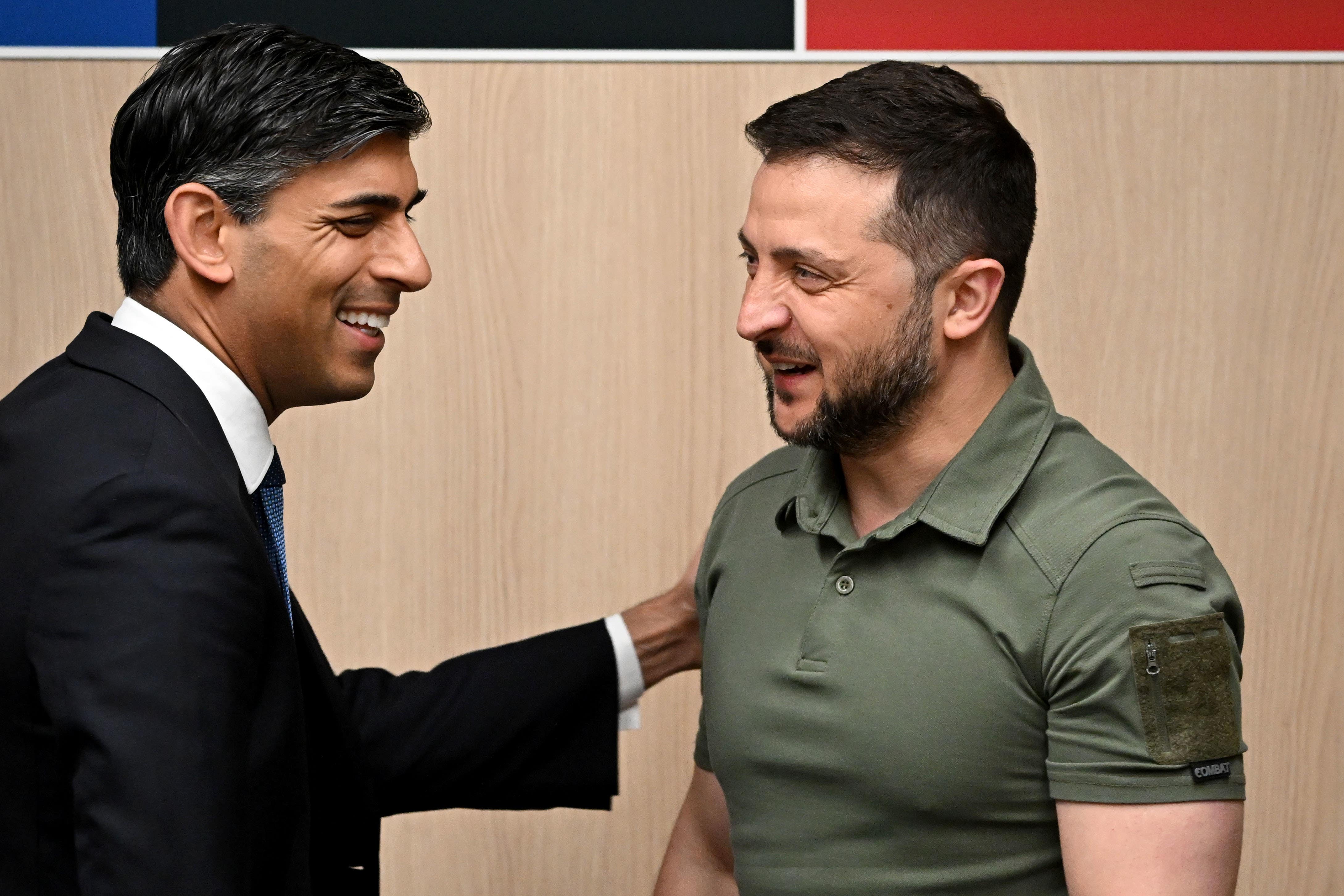‘You belong in Nato’ Rishi Sunak tells Ukrainian leader Volodymyr Zelensky
The Prime Minister met his counterpart privately to discuss plans to provide Kyiv with long-term security guarantees.

Your support helps us to tell the story
From reproductive rights to climate change to Big Tech, The Independent is on the ground when the story is developing. Whether it's investigating the financials of Elon Musk's pro-Trump PAC or producing our latest documentary, 'The A Word', which shines a light on the American women fighting for reproductive rights, we know how important it is to parse out the facts from the messaging.
At such a critical moment in US history, we need reporters on the ground. Your donation allows us to keep sending journalists to speak to both sides of the story.
The Independent is trusted by Americans across the entire political spectrum. And unlike many other quality news outlets, we choose not to lock Americans out of our reporting and analysis with paywalls. We believe quality journalism should be available to everyone, paid for by those who can afford it.
Your support makes all the difference.Rishi Sunak told Ukraine’s Volodymyr Zelensky he belonged in Nato as he assured him “real progress” had been made on providing security guarantees for Kyiv in its fightback against Russia.
The Prime Minister met the Ukrainian president on the fringes of the Nato summit in Vilnius.
Mr Zelensky has been left frustrated by the reluctance of the 31 member states to agree a timetable for wartorn Ukraine to be admitted into the international defensive alliance.
He had said it was “absurd” for Nato to insist there are still military and democratic “conditions” for the eastern European country to meet before it can join following the end of the conflict with Moscow.
Greeting Mr Zelensky in the Lithuanian capital on Wednesday, Mr Sunak said: “It is good to see you here at Nato where you belong.”
Mr Zelensky said it was “good news” that they could advance talks on security guarantees for his people, with Mr Sunak assuring him that “real progress” had been made in that regard.
The British premier has consistently stated that he sees Ukraine’s place as being in Nato but its pathway to entry has proved a sticking point among allies in Vilnius.
Mr Sunak has been working behind the scenes to deliver a non-Nato multilateral defence and economic agreement for Ukraine to give it long-term support against current and future Russian aggression.
All members of the G7 – made up of the UK, the US, France, Germany, Italy, Japan and Canada – are set to sign the pact with Ukraine while in Vilnius.
The Prime Minister has said the fresh terms have the potential to “return peace to Europe”.
Little detail has been published about what the G7 pact entails but No 10 said it would lead to increased intelligence sharing, further training of Ukraine’s forces and plans to boost Kyiv’s own defence industry.
Downing Street, in a readout of their meeting, said Mr Sunak told his counterpart the G7 security accord marked the “new high point in support” for Ukraine.
Both leaders, however, agreed the deal “will not be a substitute for Nato membership”.
Defence Secretary Ben Wallace appeared to suggest Mr Zelensky needed to be mindful about keeping “doubting politicians” in the US on-side, particularly with a presidential election coming up next year, following his critical remarks about Nato.
Mr Wallace said some allies providing defensive aid to Kyiv “want to see gratitude”.
He said the US and the UK have told Ukraine that “we’re not Amazon” – a reference to the online retail giant – after being handed requests for new weapons.
In a press conference with Nato secretary general Jens Stoltenberg, Mr Zelensky appeared to have calmed some of his language following Tuesday’s criticism of the alliance.
Mr Zelensky said it was “logical and understandable” that Ukraine could not be admitted immediately as the struggle against Russia meant the conflict would develop into a world war.
But he said Nato had sent “signals” that were “important” when it came to Ukraine becoming a member state.
“Already we can hear some confident statements (about) when the conditions will be met,” said Mr Zelensky, who was speaking through a translator.
As well as holding talks with Mr Sunak, the Ukrainian leader also met other G7 heads of state, including German chancellor Olaf Scholz and Canadian prime minister Justin Trudeau.
He is expected to meet US president Joe Biden later on Wednesday.
During the opening exchanges of their meeting, Mr Sunak praised the efforts of Ukraine’s armed forces in the pushback against Moscow’s invading forces.
The Prime Minister said: “What your soldiers are doing on the front line, it is inspiring to everyone.
“We’re proud to have played a part in training some of them.
“They have served with enormous bravery and courage.”
Mr Zelensky said his armed forces had undergone “good training missions” in the UK, with Mr Sunak adding it was clear the exercises had “been put to good use”.
During their bilateral, Conservative Party leader Mr Sunak suggested the pair meet “alone” without aides present, with the Ukrainian president agreeing that “we will be two” for the talks.
Such a move had previously been seen as unusual, but it has become a regular tactic of Mr Sunak in recent months to meet with his closest allies on a one-to-one basis.
The Prime Minister and Mr Zelensky spoke privately in Japan at the G7 in May, while Mr Sunak and French president Emmanuel Macron dismissed their advisers during discussions at the UK-France Summit in Paris in March.
Later on Wednesday, Mr Sunak and Mr Zelensky met again ahead of the first Nato-Ukraine Commission.
Nato’s secretary general said the joint commission was a “truly historic moment”.
Mr Stoltenberg told Mr Zelensky: “Today we meet as equals. And I look forward to the day we meet as allies.”